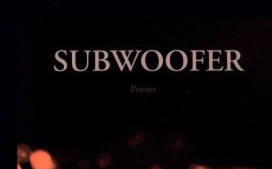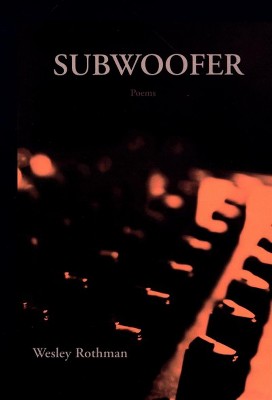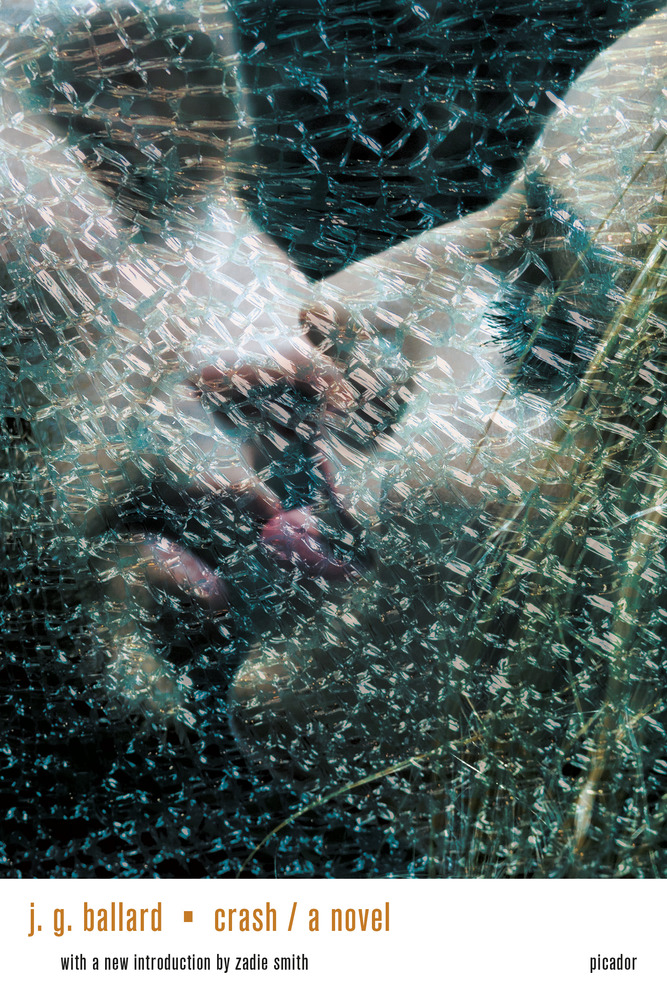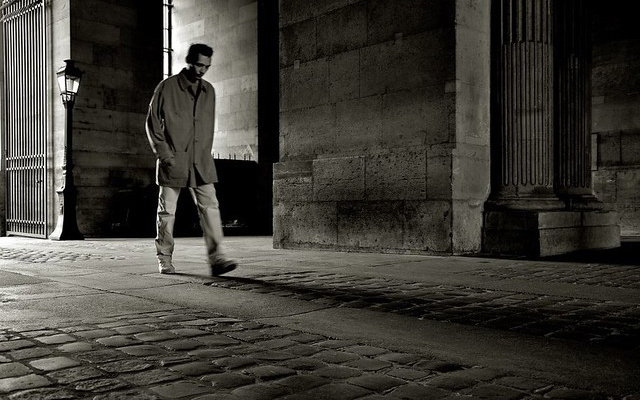
Book Review: Wesley Rothman’s Subwoofer

Enclosed in Wesley Rothman’s poetry collection, Subwoofer, are poems about how music lives inside the body. The poems, which touch on history—both the poet’s and the world’s—and race as well, follow a wave-like rhythm, growing in volume then returning to the quiet. Rothman writes of coming to terms with his whiteness and how that affects his love of music, of certain songs. With a strong voice, Rothman questions his place in sound with language and song. He proves his musical knowledge. Each poem calls to a tune, a musician, or genre, until the reader herself can hear it, can step inside the music too.
Many of the poems in Subwoofer explore not only how we are affected by sound, but how language affects the way we view the world. In “The Sleepers,” which is one of the collection’s best poems, the poet recalls being a teenager and finding a strange power in voicing an ugly word with his friends, “lobbing the word like a football / with no referee.” The poem opens:
Forbidden combinations of syllables
Hijack the mouth the throat shoulders
The delegating mind If the word is taboo
Understood or otherwise a body says it
Most abundantly I did not know
The anatomy of it
The poem questions, What does our privilege allow or disallow us to do? How is language like a weapon? How are words a mirror? What are we forgetting when we speak? The poet writes into this poem what he now knows: “We were grateful unbridled no one / Victim of the word was around.” Within the poem, there is an absence of punctuation, and instead, small spaces where periods or commas would be. At one point, Rothman points to this, connecting the blanks in the poem as blanks in a gun, and the word he used as a teenager, a real bullet, something that could wound or kill. The word was “a coded cue,” he writes. “No one knew / They were training us.”
Like “The Sleeper,” the best poems in Subwoofer write about music through a human-involved narrative lens. “Sinnerman,” a poem in which the speaker runs while listening to Nina Simone, utilizes this lens well. “Down to the dark tides / Of deep notes, she calls up / Cacophony,” Rothman writes, the sounds of the lines turning in readers’ mouths. Along with the runner, the power of Simone becomes physical, wrapping itself around a tree. Rothman is able to find words for the ache of listening to Simone, specifically the song “Sinnerman,” recognizing himself as both someone yearning to do good and someone who knows he has done wrong. It is a kind of poem to knock you out.
The following poem finishes the job. In one of the shortest, simplest poems in Subwoofer, we find one of its brightest gems. “Esther” is an elegy about a widow, who lived inside a closed room and prayed with her rosary beads. The language in this poem is careful, each word adding to Esther’s image. Rothman writes, “For years, / Each morning she muttered / From five to six. How she prepared / The day like a potter.” But even a poem that does not seem to be about music finds a way to let sound in. The poem ends like this:
The last time
I saw her she was grinning & speaking
In tongues, about her life, I think. I don’t know
If that was torment or ecstasy
Delivered by whoever might have been listening.
Overall, these poems give us the strange and wonderful gift of seeing music. Some, like “The Republic of Beat,” share this by the poem’s format, long and winding, with an asymmetrical shape and playful line breaks. Others connect sound to vision, like “Song, Remembered,” which thinks of a punch as an echo. The “Rupture of epidermis (some steps removed from skin / which belongs to a person, the wince & burn / That is theirs)…” The effect is magical almost, letting the readers experience a new connection and perspective on sound.
The way Rothman is thinking about bodies, the way he thinks about sound challenges his readers to consider their relation to the world around them. Finishing this book, I listened to the sound of my legs stretching out on the couch. I heard the noises of people outside, then went out to greet them. When I returned and opened my laptop, the sound of my typing and the turning of pages seemed to my ear, for the first time, to be music.
 Meg Boyles is an MFA candidate and poetry fellow at Chapman University. She holds a BA in Creative Writing from Hendrix College. She has been recognized by The Eudora Welty Foundation for her poetry. Her writing has appeared in several journals, most recently in B O D Y, Apricity Press, and The Cortland Review.
Meg Boyles is an MFA candidate and poetry fellow at Chapman University. She holds a BA in Creative Writing from Hendrix College. She has been recognized by The Eudora Welty Foundation for her poetry. Her writing has appeared in several journals, most recently in B O D Y, Apricity Press, and The Cortland Review.
Featured Image sourced from: https://www.culturalweekly.com/slice-summer-poetry/






clairedivas
May 9, 2019 at 2:02 amWhat a great article share. A great contribution especially for someone looking forward to buy a car subwoofer, amplifier and enclosure. If anybody want to install new one, this is the most effective share, that will be very helpful for best choice. Thanks a lot for post
Maria Lena
October 28, 2019 at 12:48 amThank you for sharing the knowledge and the tips! It is very helpful and informative. Don’t forget to use elcometer to measure the thickness of the paint to make it easier for you to get the painting job perfectly done. Anyways, would love to see more of your posts.
sammy
September 7, 2020 at 5:19 amThanks for sharing. I was looking at the same information on internet